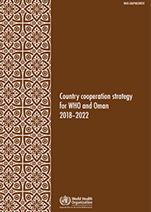On 11 February, Dr Tedros attended the launch of Oman’s National Policy and Multisectorial Plan on Prevention and Control of Noncommuncable Diseases, an event held under the auspices of H.H. Sayyid Shihab bin Tariq bin Taimour Al-Said, Advisor to His Majesty Sultan Qaboos bin Said. The national plan focuses on combating the four main noncommunicable diseases – cardiovascular diseases, diabetes, chronic pulmonary diseases and cancer. Globally, these diseases are the main causes of premature deaths in both developed and developing countries.
WHO has commended Oman for its resolute commitment to implementing the United Nations Declaration on Prevention and Control of Noncommunicable Diseases. Addressing noncommunicable diseases is also identified as a top public health priority in Oman’s Health Vision 2050, the country’s long-term vision for the development of its health system. Ensuring effective prevention and control of noncommunicable diseases is dependent on a well-functioning health system – also an important prerequisite for achieving universal health coverage. In Oman, adequate investment in the health sector with the adoption of an intersectoral approach involving all related sectors to improve health have been important contributors to effectively addressing risks factors for noncommunicable diseases. The involvement of multiple sectors in partnership in Oman’s Higher National Committee on Prevention and Control of Noncommunicable Diseases has also demonstrated the Committee’s ability to convert commitments into action, highlighted the contribution of each sector and clearly identified roles and responsibilities in progress towards reducing risk factors, preventing premature deaths and prolonging healthy years of life.
During his visit, Dr Tedros delivered a speech to graduates and faculty of the Oman Medical Specialty Board. On 10 February, he was received by H.H. Sayyidh Fahed Al Said, Deputy Prime Minister for the Council of Ministers, on behalf of His Majesty the Sultan. Dr Tedros thanked His Highness for receiving the WHO team in Oman and commended Oman for its public health successes which he attributed to investments in primary health care and the country’s advancement of the Health for All agenda.
Dr Tedros also attended an event with H.E. Dr Ahmed bin Mohamed bin Obaid Al Saidi, Minister of Health of Oman, to launch the Country Cooperation Strategy for WHO and Oman 2018–2022, which reflects the medium-term vision of WHO for technical cooperation with Oman and defines a strategic framework for working in and with the country. WHO will continue its close collaboration with the Ministry of Health and other partners in the country to strengthen joint efforts to address priority areas of public health by promoting equity and quality of services.
"The visit of WHO’s Director-General is a demonstration of WHO’s highest level commitment to its valued partnership with Oman for promoting not only the regional but global health agenda," said Dr Akjemal Magtymova, WHO Representative to Oman.
Related links
WHO/Oman's Country Cooperation Strategy at a glance
 Country Cooperation Strategy for WHO and Oman 2018–2022
Country Cooperation Strategy for WHO and Oman 2018–2022


